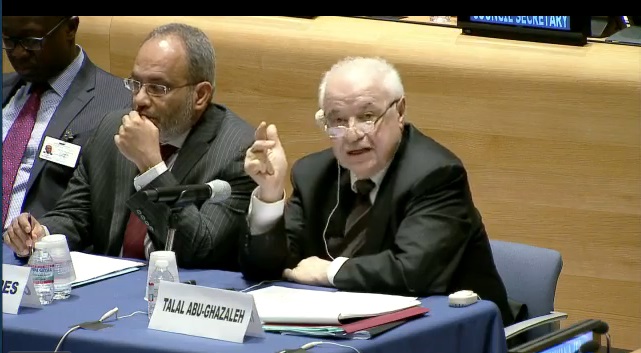Dr. Abu-Ghazaleh Stresses the Need to Develop a Framework for a Global Network and Community of Stakeholders for Employment-Centric Sustainable Development
17 Jul 2014NEW YORK ---- July 17, 2014 ---- HE Dr. Talal Abu-Ghazaleh, chairman of Talal Abu-Ghazaleh Organization (TAG-Org) took part in the ministerial integration panel of the High-Level Segment of the United Nations Economic and Social Council (ECOSOC) that was held at the UN Headquarters in New York.
The objective of the panel is to bring together high-level policy-makers from both developed and developing countries to deliberate on the opportunities and constraints in, and share the experiences and lessons learnt with, policy integration to promote sustainable development.
Members of the panel discussed the ways and means for pursuing employment-centric sustainable development strategies and identify the challenges that many governments face in integrating their macroeconomic, social and environmental policies.
The High-Level Segment of the ECOSOC constitutes a platform for a focused discussion on policy integration for promoting sustainable development.
In his keynote address on integrating employment-centric sustainable development in the post-2015 development agenda, Dr. Abu-Ghazaleh stressed that employment-centric sustainable development requires inter-alia from governments, corporate sector, development cooperation and from all actors.
“The jobless growth model of the last decades has deepened inequality increasing unemployment (your employment rate is three times higher than the overall unemployment rate),” he said, stating that skills gaps and mismatch represent the main underlying causes of poverty and inequality.
“Public investment in education, while guaranteeing better access, has grown highly irrelevant to the rapidly changing job profiles in the market. Greening jobs demand different set of skills; older jobs disappear, workers seeing themselves irrelevant to the new labor markets,” he added.
Dr. Abu-Ghazaleh stated that wider focus on relevant human capitals for the new economy.
“Classroom education will gradually transition to less remote learning processes from the labor market itself. This process requires a stronger partnership between schools and corporations.”
He noted that soft skills such as financial, digital and entrepreneurial literacy should expand in the school curricula as equally relevant to all jobs in the current and future labor markets and business environments.
“Flexible access to vocational education while continuing general learning (Japan’s system) to ensure people gain employable skills, should they consider working and further studying, is a better way to improve mobility in the labor market. Non formal skills people acquire at the workplace need recognition and integration in the national frameworks to also support mobility of labor force.”
Moreover, Dr. Abu-Ghazaleh pointed out that TAG-Org works closely with the United Nations Development Group member organizations as their mandate are broader including all four areas of focus: the economy, the society, the environment and the public governance.
"I am one businessman who believes in the United Nations and I had the honor and privilege of serving in many UN positions and I will mention some of them which I chaired: the UN Global Alliance for ICT and Development, the UN ICT Task Force, the UN Internet Governance Forum in addition to others," he said.
“TAG-Org has been invited to chair the Advisory Board of the UNDP Istanbul International Center for Private Sector in Development that was established to leverage the role of businesses in inclusive market building. We believe that this membership will place TAG-Org at the core of the post-2015 Inclusive Business Development Agenda.”
"Employment contributes to development as much as development contributes to employment. We need to have a structural approach I think what we need here is to develop an action plan perhaps we need to have a steering committee and a board appointed by ECOSOC in addition to more focus on women and youth," he concluded.





